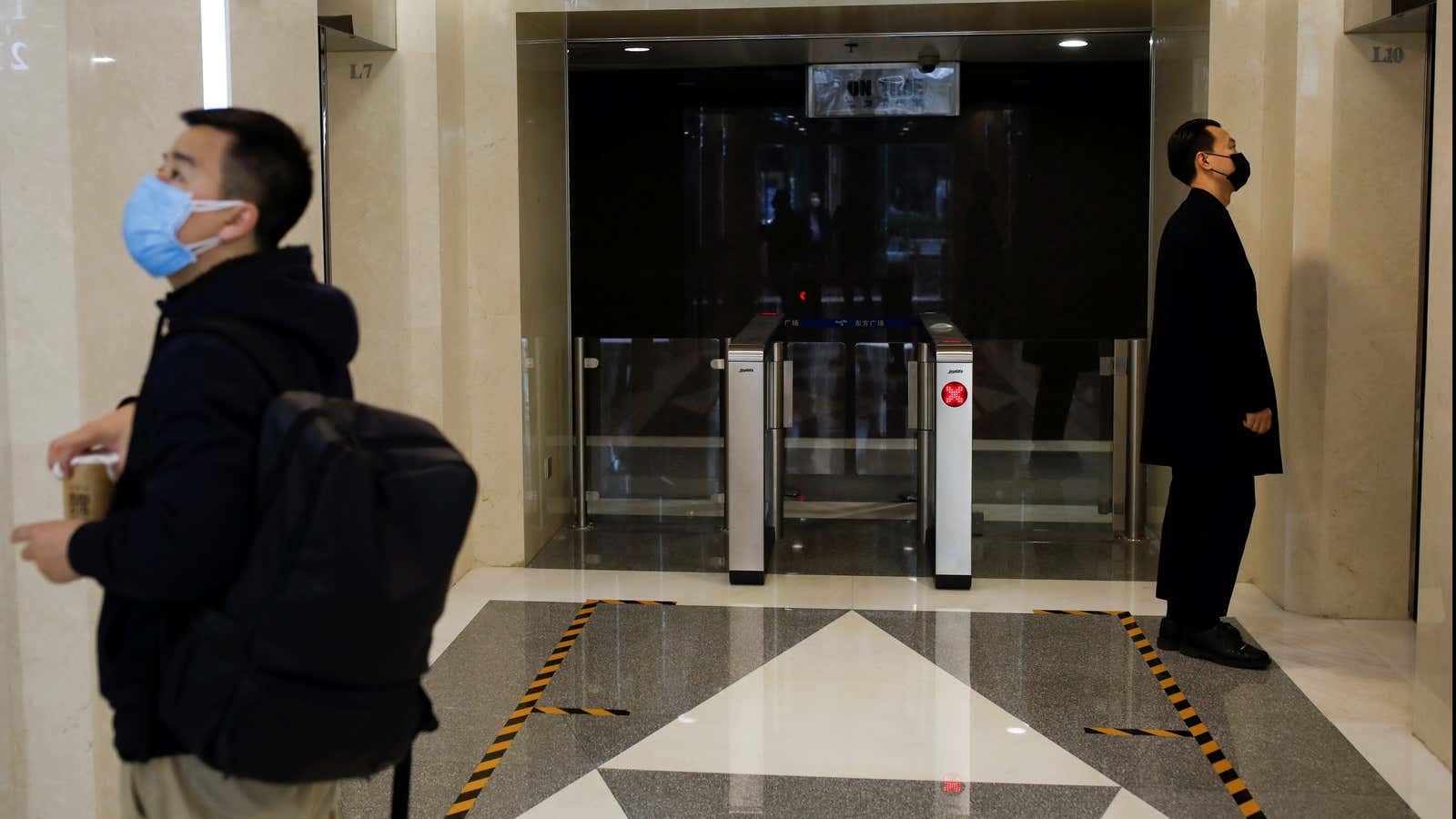On a May 7 conference call with executives, Salesforce CEO Marc Benioff sketched out some details about how his global firm plans to reopen its offices.
To manage the return of its 50,000 employees around the world, Salesforce will use its own Work.com suite of apps, which will allow employees to register their temperature in the morning, using their phones, and track self-testing results. (The company recently debuted the same software for Salesforce customers to direct their own reopening projects.)
Contact tracing will be available through the platform, Benioff said. If an employee lets the company know they’ve developed a fever or another symptom of Covid-19, an in-house tracing team will immediately reach out to any employees the sick person had been around in the building the previous day and will instruct those staffers not to come into the office, but rather to shelter at home for two weeks.
And then there are the plans for the elevators, where observing social-distancing guidelines will be especially challenging.
When returning Salesforce employees check in for work before leaving their homes (oh, yes, this is another expected new workday norm), they’ll be given a ticket to ride the elevator during a specific window of time, “much in the same way that you would arrive at Disney for a ride,” Benioff said.
The elevator quandary
The conference call on which Benioff spoke, which was led by Fortune CEO Alan Murray, brought together members of the CEO Initiative, a forum for business leaders committed to conscious capitalism. It was themed around the question of exactly how businesses and the economy would reopen, and members of the press were invited to attend only the first 15 minutes of the powwow. In that time, Benioff mainly spoke about plans for the Salesforce office in Seoul, South Korea, which has had remarkable success suppressing the spread of the virus.
“We will open on May 11,” Benioff said. “We will do all the things you’d expect us to be doing.” That includes providing employees with personal protection equipment (PPE), plexiglass barriers between desks, and enforcing social distancing inside the building.
“Employees will be zoned into different parts of the real estate and asked to maintain a certain space during the day, so we have appropriate distancing on the floors as well,” Benioff explained.
Benioff’s comments about the elevators were particularly interesting, given that the elevator quandary is going to be a puzzle for many offices once quarantines are lifted. In New York City alone, for instance, there are more than 76,000 elevators, typically offering an estimated 4 million rides per day in residential and office buildings.
In commercial spaces, technological advances and smart design has allowed most major buildings to keep thousands of employees moving swiftly up and down office skyscrapers without much need for queuing. How will that work, though, when people are afraid to press buttons or stand near another person? Daily elevator reservations are one option; but what happens when someone needs to leave the building to grab lunch or rush off to a client meeting?
Spare a thought, too, for Hollywood, where the chance-encounter-on-an-elevator scene is a sacred trope found in romantic comedies, taut dramas, and even thrillers. Before Covid-19, both the crowding and the randomness of passenger combinations made elevators a believable spot for chance meetings. Perhaps now screenwriters will have to start exploiting the meet-cute possibilities of the lobby elevator queue.
The 18-month recovery phase begins
Like other private-sector leaders, Benioff has joined and led efforts to buy and deliver protective equipment to hospitals in the US and around the world, enlisting the help of friend Daniel Zhang, CEO of Alibaba, in his case.
The last 90 days have constituted the crisis-response phase of the pandemic, Benioff said, at the beginning of which he had never heard the phrase PPE. He estimates that the next phase, a “recovery phase,” will last 18 months and possibly include waves of new outbreaks, until a vaccine is widely available.
Plans are underway to open the firm’s San Francisco headquarters in “the first week, or so, of June,” Benioff said. The workplace will be “slightly different,” he explained. Not only will the elevators travel each with only a few people instead of the usual 10 or 20, he noted, but employees will likely be asked to wear masks at their desk and to follow all the same guidelines the company will establish in South Korea.
“Things that have been a huge part of our culture, you know the big jar of gummy bears in the snack bar area—it’s not going to be there,” said Benioff. But he’s optimistic that “we can be very successful in the work environment, doing all of this.”
